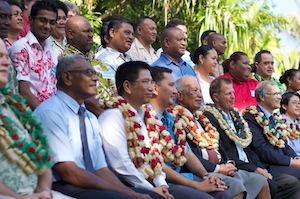
Nadi, August 7, 2012: After three years of hard work Pacific Island countries are starting to deliver significant results under a regional project that was set up to address some of the most challenging water and sanitation issues in the Pacific.
The Global Environment Facility (GEF) funded Pacific Integrated Water Resources Management (IWRM) Project was launched in 12 countries in 2009 to protect vital watersheds, manage wastewater and sanitation, assess and protect water resources, and improve water efficiency and safety. The benefits of the work are now starting to be felt in the region.
“When we started out water and sanitation issues were dealt with sectorally, with agencies only focusing on their small part of a bigger problem and not communicating or working together in a coordinated and efficient manner,” Marc Wilson, Regional Project Manager for the GEF Pacific IWRM Project, said. “By demonstrating an integrated approach through tangible on-the-ground activities, we’ve seen a change in that. Not just in the localised area of the demonstration project but in many countries nationally, and also regionally.”
“For example in the Nadi Basin there was little consultation or long-term strategic planning between different sectors but the establishment of the Nadi Basin Catchment Committee (NBCC) has changed that. We now have all the key players around the same table discussing and making decisions on water management and flood reduction strategies and the Fiji Government is looking at replicating this model in other important catchments like Ba,” Mr Wilson said.
To celebrate the results achieved by Pacific Island Countries, a competition was launched this year with 12 countries submitting results notes on their progress towards regionally agreed targets for water and sanitation management. The competition was won by the Fiji project, which focuses on the critical issue of flood risk planning in the Nadi Basin.
Speaking at the opening of the project’s 4th Regional Steering Committee meeting in Nadi last week, Fiji’s Minister for Primary Industries, Joketani Cokanasiga, noted the significance of the results achieved by the Nadi initiative.
“There is improved coordination amongst government agencies, stronger links between government and communities, and farmers and villagers are better at preparing for, and taking steps to prevent, the damaging floods that affect Nadi.” Mr Cokanasiga said.
In some of the smallest island countries, like Tuvalu, the Marshall Islands, and Nauru, even short dry spells can lead to a water crisis, so protecting what little water there is from pollution is a priority.
Mr. Pisi Seleganiu, IWRM Demonstration Project Manager for Tuvalu, said the installation of 40 compost toilets on Funafuti Atoll has resulted in a 5 percent reduction in sewage pollution of groundwater and coastal waters.
“These results have been instrumental in helping us get additional funding and resources to scale up our work to include a further 60 houses, which should deliver a further 8 percent reduction in sewage pollution,” Mr. Seleganiu said. “With more planning between government and development partners and increased community commitments I think we’ll have even further reductions in the near future.”
In his speech to delegates at the meeting , Toily Kurbanov, Acting Resident Representative at the United Nations Development Programme’s Multi-Country Office in Fiji , congratulated the countries on their efforts and asked them to remember three priorities which are consequential for the project’s ultimate success: Measurements, Sustainability and Gender.
“According to our estimates most if not all of the project’s activities are firmly on track. Communities have been engaged, committees formed, awareness raised and a number of useful demonstration projects successfully carried out,” Mr Kurbanov said.
“Yet, we think that after three years and millions spent in the project’s implementation, we should also start to measure not only activities but also the project’s actual impact in the communities we serve. Do we know how many people the project reached out to and counts among its beneficiaries? Do we know their demographic breakdown?” Mr Kurbanov asked. “We should bear in mind that beneficiaries of this crucial information won’t be just us, the implementing partners and RSC, but also the much broader constituency of development practitioners and policy makers in the Pacific.”
On sustainability Mr Kurbanov asked delegates to consider questions like: Will IWRM become part of the region’s integrated response to the dangers posed by climate change? Will the results sustain themselves and be replicated and brought to scale? And do the project activities harness Pacific societies’ traditional strengths?
He ended by reminding delegates the importance of taking into consideration gender.
“There is a global consensus that if development does not benefit half of the global population then it is not development. We need to make sure that the IWRM project delivers strong benefits for Pacific women and girls,” Mr Kurbanov said.
Mr Christian Severin from the GEF Secretariat, commended the 12 countries for communicating their results regionally and to the rest of the global portfolio of GEF International Waters projects.
“The Results Notes prepared and presented by 12 countries at this meeting clearly show results are being achieved and provide the types of information and data that are necessary to convince politicians and other stakeholders of the benefits of investing in the critical reforms required for water and sanitation in the Pacific,” Mr Severin said.
The GEF funded projects are executed regionally through the Secretariat of the Pacific Community’s Applied Geoscience and Technology Division (SOPAC). The United Nations Development Programme (UNDP) and the United Nations Environment Programme (UNEP) are implementing agencies. The European Union has supported a regional effort to develop national IWRM plans and policies in Pacific island countries.
Further information on this initiative can be accessed online at http://www.pacific-iwrm.org.
ENDS
Contact
Tiy Chung, SOPAC Communications Advisor, Mobile: +679 998 7586, email:
This e-mail address is being protected from spambots. You need JavaScript enabled to view it





